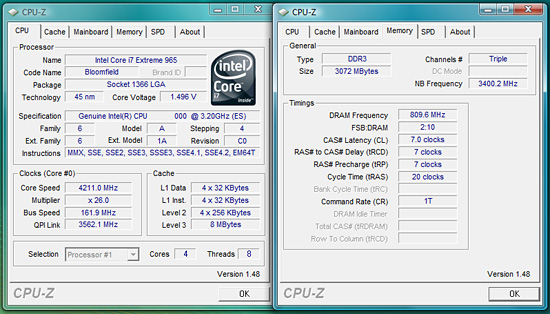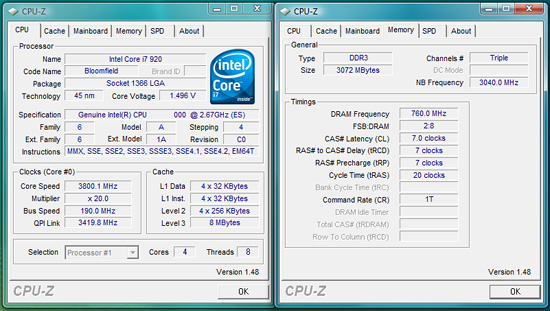The Dark Knight: Intel's Core i7
by Anand Lal Shimpi & Gary Key on November 3, 2008 12:00 AM EST- Posted in
- CPUs
Overclocking: The Initial Results
Our first overclock test with the top Core i7 processor, the 965XE, suggests an average high-end air or water-cooled, 24/7 stable overclock of about 4.2GHz (roughly the same as the latest Yorkfield-based, quad-core processors available right now). Our VCore setting had to increase to 1.5V for stable operation, a significant jump from the 1.4125V required at 4GHz on this board. We set QPI/Dram to 1.325V and VDimm to 1.65V. Our top clock with this particular CPU on our FreeZone Elite cooler is 4.5GHz with 1.55V.
Our second overclock test utilized the 920 processor that clocks in at a stock 2.66GHz. The multiplier is locked on this CPU and the 940 model so overclocking is done via Bclk. We were able to reach a 24/7 stable 3.8GHz overclock on 1.5V with memory (BIOS 0503 raised our voltage requirements) at DDR3-1520 (7-7-7-20) on 1.675V. We think 4GHz is possible on this board with additional tuning and a BIOS update. However, Bclk is limited to around 200~220 on the current i7 series, so additional headroom is probably limited on this CPU. However, performance was excellent during overclocking and a 3.6GHz overclock was possible with 1.425V. This CPU reminds us of the Q6600 at launch, an excellent overclocker that continues to be a bargain.
Although the new architecture allows for near-independent tuning of the processor cores and the underlying memory subsystem, mastering your system will still require a fair amount of patience and consideration. There are numerous tuning tradeoffs with this platform that we are still working through at this time. One such trade off is determining whether to use high CPU multipliers and standard memory ratios when overclocking versus a lower CPU multiplier and high Bclck (bus speed) combination.
In early testing, we have found advantages to both methods depending on the application. It appears right now that a combination of higher Bclk with a lower CPU multiplier will provide a slightly better performing platform, if you can properly balance the memory timings, voltages, and speed. We will help direct your efforts in this process by providing a complete overclocking guide for Core i7 shortly.












73 Comments
View All Comments
Clauzii - Thursday, November 6, 2008 - link
I still use PS/2. None of the USB keyboards I've borrowed or tried out would work in 'boot'. Also I think a PS/2 keyboard/mouse don't lag so much, maybe because it has it's own non-shared interrupt line.But I can see a problem with PS/2 in the future, with keyboards like the Art Lebedev ones. When that technology gets more pocket friendly I'd gladly like to see upgraded but still dedicated keyboard/mouse connectors.
The0ne - Monday, November 3, 2008 - link
Yes. I have the PS2 keyboard on-hand in case my USB keyboard can't get in :)Strid - Monday, November 3, 2008 - link
Ahh, makes sense. Thanks for clarifying!Genx87 - Monday, November 3, 2008 - link
After living through the hell that were ATI drivers back in 2003-2004 on a 9600 Pro AIW. I didnt learn and I plopped money down on a 4850 and have had terrible driver quality since. More BSOD from the ati driver than I have had in windows in the past 5 years combined from anything. Back to Nvidia for me when I get a chance.That said this review is pretty much what I expected after reading the preview article in August. They are really trying to recapture market in the 4 socket space. A place where AMD has been able to do well. This chip is designed for server work. Ill pick one up after my E8400 runs out of steam.
Griswold - Tuesday, November 4, 2008 - link
You're just not clever enough to setup your system properly. I have two indentical systems sitting here side by side with the only difference being the video card (HD3870 in one and a 8800GT in the other) and the box with the nvidia cards gives me order of magnitude more headaches due to crashing driver. While that also happens on the 3870 machine now and then, its nowehere nearly as often. But the best part: none of the produces a BSOD. That is why I know you're most likely the culprit (the alternative is faulty hardware or a pathetic overclock).Lord 666 - Monday, November 3, 2008 - link
The stock speed of a Q9550 is 2.83ghz, not 2.66qhz.Why the handicap?
Anand Lal Shimpi - Monday, November 3, 2008 - link
My mistake, it was a Q9450 that was used. The Q9550 label was from an earlier version of the spreadsheet that got canned due to time constraints. I wanted a clock-for-clock comparison with the i7-920 which runs at 2.66GHz.Take care,
Anand
faxon - Monday, November 3, 2008 - link
toms hardware published an article detailing that there would be a cap on how high you are allowed to clock your part before it would downclock it back to stock. since this is an integrated par of the core, you can only turn it off/up/down if they unlock it. the limit was supposedly a 130watt thermal dissipation mark. what effect did this have in your tests on overclocking the 920?Gary Key - Monday, November 3, 2008 - link
We have not had any problems clocking our 920 to the 3.6GHz~3.8GHz level with proper cooling. The 920, 940, and 965 will all clock down as core temps increase above the 80C level. We noticed half step decreases above 80C or so and watched our core multipliers throttle down to as low as 5.5 when core temps exceeded 90C and then increase back to normal as temperatures were lowered.This occurred with stock voltages or with the VCore set to 1.5V, it was dependent on thermals, not voltages or clock speeds in our tests. That said, I am still running a battery of tests on the 920 right now, but I have not seen an artificial cap yet. That does not mean it might not exist, just that we have not triggered it yet.
I will try the 920 on the Intel board that Toms used this morning to see if it operates any differently than the ASUS and MSI boards.
Th3Eagle - Monday, November 3, 2008 - link
I wonder how close you came to those temperatures while overclocking these processors.The 920 to 3.6/3.8 is a nice overclock but I wonder what you mean by proper cooling and how close you came to crossing the 80C "boundary"?